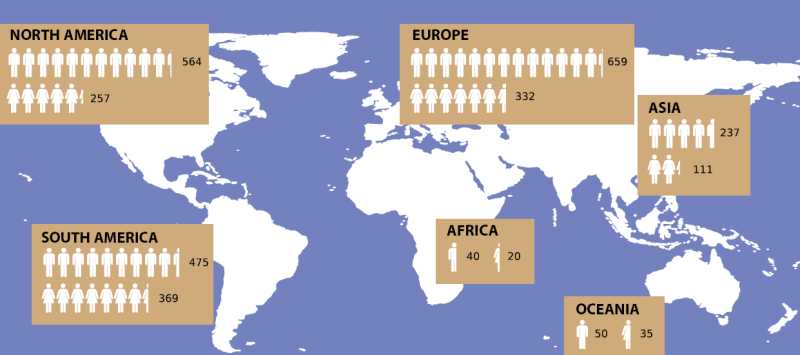From: Boncourt, Thibaud. A History of the International Political Science Association 1949-2009. Montreal: The International Political Science Association, 2009.
- Prologue
- Building the Association
- Contributing to Political Science
- Becoming International
- Conclusion
Prologue: Political Science, a Postwar Product (1947-1949)
Recalling the Sophists who approached Socrates with the argument that motion did not exist, to which the philosopher replied by merely arising and starting to walk, so Unesco had transformed speculative and theoretical arguments as to the existence of a political science into action by calling the present conference.
Maurice Duverger at the founding conference of the IPSA,
12 September 1949
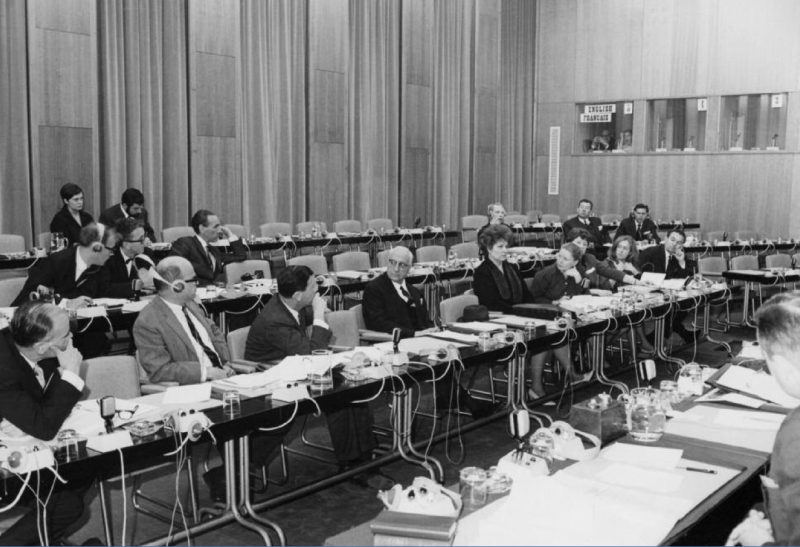
It is hard for political scientists of 2009 to imagine the condition and status of their discipline in the world under reconstruction of 1949. In place of the familiar, well-structured web of national associations we know today, there were associations only in the United States (founded in 1903), Canada (1913), Finland (1935), India (1938), China (1932), and Japan (1948). Communication between them was virtually nonexistent, although they were aware that they were not alone in the world. What little (minimal) international cooperation in political science there was occurred through the Academy of Political Science and Constitutional History, an organization Jean Meynaud would later decry as an "instrument of personal politics” conducting "extremely limited” activities1. The very definition of "political science” was uncertain, and the relevance of any distinction between philosophy, the social sciences, and the humanities was the subject of debate.
The desire of the new United Nations Educational, Scientific and Cultural Organization (UNESCO) to stimulate development of the social sciences therefore necessarily gave rise to an enterprise that had both intellectual and institutional aspects. The intellectual outlines of the project were drawn at UNESCO’s first general conference in December 1946 by the Social Sciences, Philosophy and Humanistic Studies Sub-Commission, a very heterogeneous body comprising a Philippine historian as chairperson, a Polish novelist and a Chinese linguist as vice chairs, and an American sociologist and a Danish philosopher as rapporteurs. After debating the issues, the Sub-Commission took note of the distinction between "social science" on the one hand and "philosophy and the humanities" on the other. Drawing on the theme enunciated by US President Franklin Roosevelt that "if civilization is to survive, we must cultivate the science of human relations," it assigned the social sciences the task of furthering friendship between peoples by promoting mutual understanding and fostering the removal of such obstacles as "nationalism, antagonisms of a technological character, insufficiency of government action, problems relating to movements of population or relations of dependency between two peoples."2
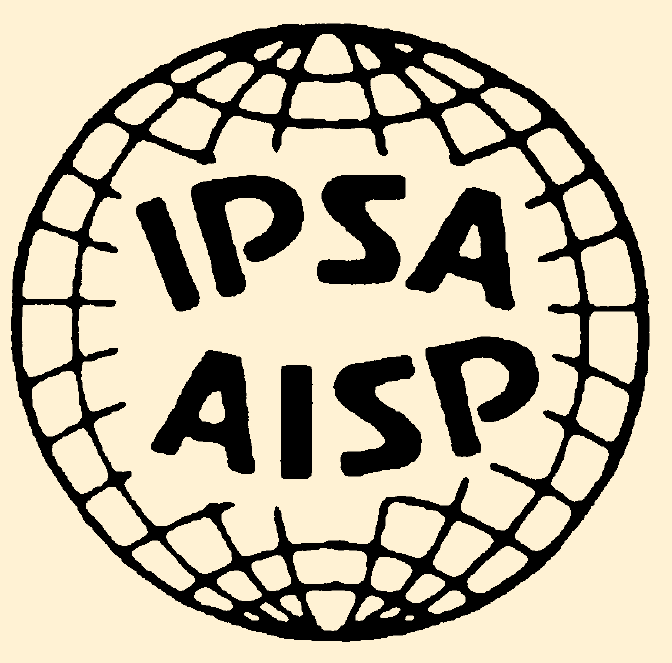
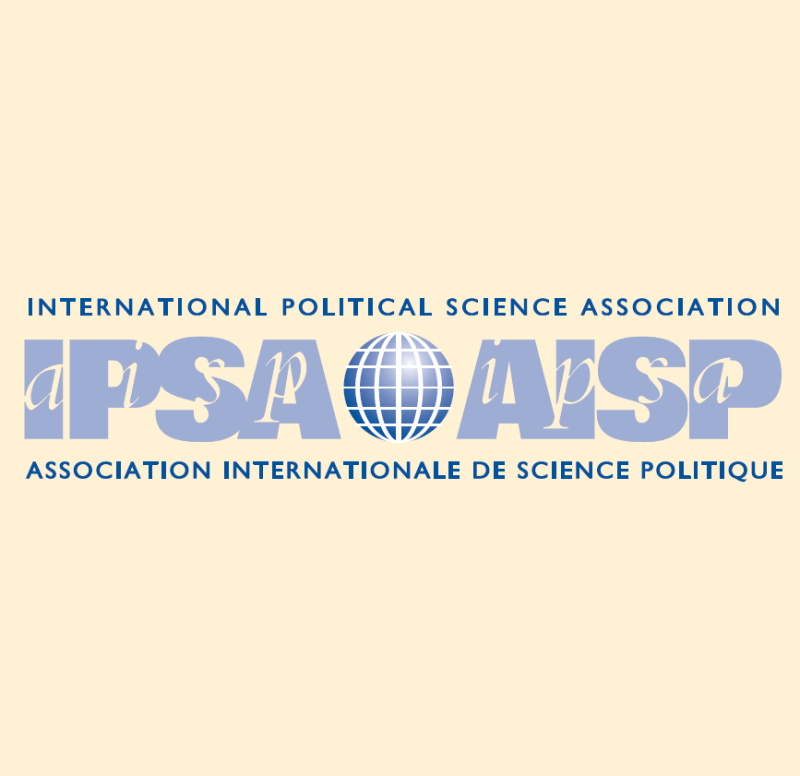

Subsequent general conferences further refined this highly political project, and in 1948, seven priority topics for research were identified. Four amounted to a reassertion of the peace-making potential of the social sciences: the study of "tensions affecting international understanding"; the "philosophical analysis of current ideological controversies"; the "study of international collaboration"; and an enquiry into the "humanistic aspects of culture." Two other topics, "social implications of science" and "scientific and cultural history," made it clear that the young social sciences were to be a tool for controlling the natural sciences, following on the disillusionment brought on by their exploitation for military purposes. One area of research alone was only indirectly related to the demands of reconstruction; the object of the project "methods in political science," was:
To promote the study of the subject-matter and problems treated by political scientists of various countries in recent research materials..., the various types of approach and emphasis, the methods, techniques and terminology employed and the quantity of production in recent political science.3
It is somewhat surprising that a project would be so specifically targeted at the field, for it was hardly to be expected that such a pioneering course of action would be laid out for an as-yet embryonic discipline whose very legitimacy was contested. Yet, as far as UNESCO was concerned, the priority being given methodological issues was amply justified by the research questions that political science was to ponder. Since political science was to study a political realm that was held responsible for the collapse of the world order, it was urgent that it be given the means both to study and to reform the defective institutions.
The professionals who met for the first time in Paris on 16 September 1948 embraced this mission in the summary of their proceedings:
The large and expanding sphere of government activity in all countries, and the emotions and interests which are aroused by politics, make it highly desirable that both political ideas and political practice should receive disinterested study. It is the aim and purpose of political science to provide such study. It is legitimate to believe that by this means the political insight and discrimination of the people may be increased, a more informed public opinion brought to bear on political problems, and the work of government improved at all levels.4
For the participants in the September 16 meeting, bringing this ambitious project to fruition meant establishing a dialogue between political scientists from different countries and disciplines. Unfortunately, although the idea behind the project was simple, it entailed major practical problems, for it involved nothing less than clearing a space on the international scene for a discipline whose autonomous status was barely acknowledged outside the United States. It further involved bringing political philosophers, political jurists, political historians, and political economists to work together and, in general, creating a semblance of unity out of extreme diversity.
Well aware of these difficulties, the eight participants were very circumspect and underscored the point that:
The aim of international cooperation… is not to substitute a uniform treatment of the subject for the prevailing diversity of topics and methods. The juridical, historical, philosophical, sociological…, psychological and statistical methods have all been successfully used in the study of political ideas and institutions....
Taking the heterogeneous membership of their group into account5, they showed consideration for most of their number when they came to define the four fields of study that were the province of political science. They thus acknowledged the influence of the philosophers with "political theory," the jurists with "government," the internationalists with "international relations," and the fledgling behaviorist school of American political science with "parties, groups and political opinion." They kept their objective of international collaboration well in sight, though. They perceived it as an absolute heuristic necessity that would, ultimately, lead to the development of "scientifically valid" criteria that would enable them to separate the wheat from the chaff in existing studies. Still, the concessions to the various "factions" put the project on an only somewhat more solid footing than before.
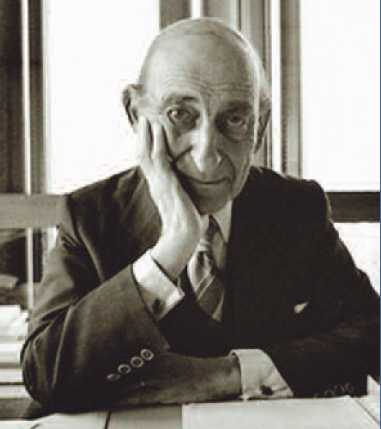
Despite its fragile underpinnings, the intellectual enterprise was coupled with an institutional one. To follow up on the 1948 General Conference decision to give organizational substance to the promotion of mutual knowledge among scholars, the creation of an International Political Science Association was given strong—and financial—encouragement. The researchers who met on 16 September 1948 thus imagined an IPSA that was consistent with their ambitions. They planned for an association that would have a wide range of tools at its disposal: an international documentation center, a research bulletin, an abstract service, translations of basic documents, international conferences, travel grants for researchers, and encouragements for international research projects. Everything, however, would be geared to a single goal: facilitating mutual knowledge in order to advance knowledge and, ultimately, "[encourage] in all countries... improved techniques of political organization." Implementation of this as-yet bare-bones project was Raymond Aron, head of the "methods in political science" project and chairman of the September 1948 and 1949 conferences in Paris assigned to a preparatory committee made up of Walter R. Sharp (United States, chairman), John Goormaghtigh (Belgium, secretary), Raymond Aron (France), William A. Robson (United Kingdom), Angadipuram Appadorai (India), and Marcel Bridel (Switzerland).
The project gained momentum in the year following the September 1948 conference. The first meeting spurred national communities to form associations so that they would carry some weight in the future IPSA from the very outset. France’s political science association was thus founded in 1949, while similar dynamics bore fruit soon afterwards in the United Kingdom, the Netherlands, Israel, Sweden (1950), Germany, Belgium, Mexico, and Greece (1951). At the same time, on the international level, the committee chaired by Walter Sharp set to work and produced extensive correspondence. Proposals for the constitution of the organization came thick and fast, but stumbling blocks outnumbered areas of consensus. The founding conference of the IPSA, which was held from 12 to 16 September 1949 in Paris, was thus no mere formality and had to settle some major issues.
Sixteen countries met at the conference; four (United States, France, Canada, and India) were represented by a delegate from their national Association. Given the problems mentioned earlier, it is hardly surprising that their debates came quickly to center on the relevance of even creating an IPSA, especially since an International Institute of Administrative Sciences (IIAS) was already operating in Brussels. It would be wrong to think this was merely an organizational issue; the very intellectual legitimacy of political science was at stake
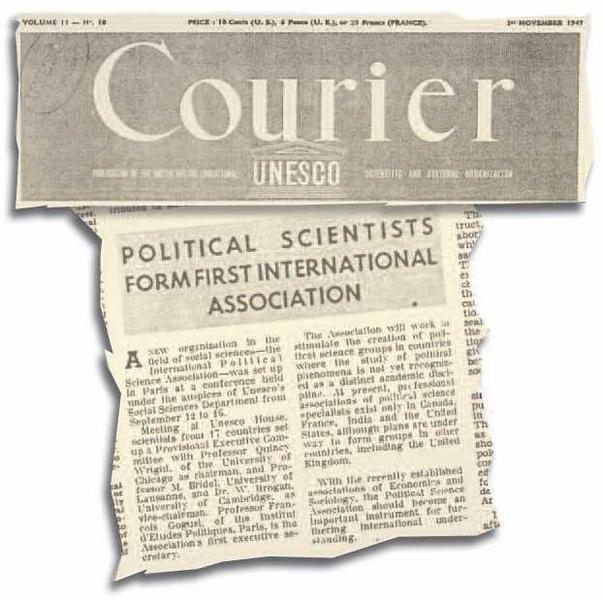
The suggestion to create a joint secretariat for the IPSA and IIAS reflected doubt in the minds of some people that there was any real demarcation line between their respective fields of research.6 The need to differentiate themselves from the IIAS pushed the participants to distance themselves from the political agenda of UNESCO and to adopt an enforced positivism. In the words of Maurice Duverger:
It would be fatal to the future of political science to establish overclose relations with an Institute of Administrative Sciences. Such an institute [is] mainly concerned with administrative technique, that is to say, with problems of method, output and practice. The aim of the present Association [differs] in that it [proposes] to define sociological laws. Such a difference [is] the same as that between medicine, which [is] an art, and biology, which [is] a science, the latter enabling progress to be made in the former.7
This position was increasingly echoed over the course of the conference. D.W. Brogan even came to plead explicitly for the Association to "avoid an attempt to do all the things which Unesco does"; it should be an "academic body" and not "branch out into other fields."8 The participants thus intentionally tried to keep themselves at arm’s length from the world of political action. They treated the question of whether the intellectual pretentions of political science were legitimate as settled—if not absolutely at least sufficiently to meet their own immediate needs.
The debates could therefore now move on to organizational matters. Numerous decisions were made, which cannot be dealt with in any detail in this brief survey. However, we shall take a closer look at one of the most hotly debated and immediately consequential issues: the choice of a headquarters for the new IPSA.
The problem was not an easy one, for choosing a headquarters also meant choosing a legal framework, a working language, an executive secretary, and offices. Clearly, too, the choice meant acknowledging the host country in a way. Lastly, the choice imposed conditions on the composition of the Executive Committee; for reasons of both finance and the smooth operation of the Association, its members could not be based too far from the headquarters. The question of the location had already been raised but left unresolved by the preparatory committee and was the subject of long discussions over the course of the conference.
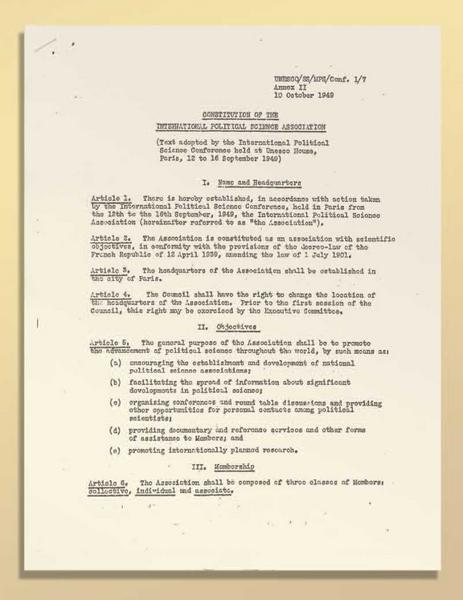
From the outset, there was unanimous agreement on only one point: the IPSA had to be located on the continent of Europe in order to foster development of the discipline there. This view was so widely shared that the American Political Science Association (APSA) voted a resolution to this effect on 29 December 1948.9
There remained the problem of which European city to choose. Three possible sites were proposed: Brussels, Geneva and Paris. Brussels was where the highly esteemed secretary of the preparatory committee, John Goormaghtigh, was from. However, it was already the site of the IIAS, and, as we have seen, the political scientists wanted to keep their distance from that body. Geneva had the advantage of offering, as Maurice Duverger put it, "political serenity" to an association that would have to deal with "'explosive' questions." But the city was already home to too many international associations and lacked a candidate for the job of secretary. In the end, Paris, the third option, which was proposed rather late in the discussions, carried the day. The French capital had in its favor the fact that it was already the site of UNESCO and that it had a candidate for the post of Executive Secretary in the person of François Goguel. Moreover, the Fondation Nationale des Sciences Politiques (FNSP) could provide the necessary logistic facilities.10 The IPSA was thus constituted as a "foreign association" under French law.
The selection of Paris led to the selection of a Provisional Executive Committee that included eight Europeans: Marcel Bridel (Switzerland, vice president), Denis W. Brogan (United Kingdom, vice president), Jan Barents (Netherlands), Fehti Celikbas (Turkey), Maurice Duverger (France), John Goormaghtigh (Belgium), Elis Hastad (Sweden), and Adam Schaff (Poland). Also members were two North Americans, Quincy Wright (United States, president) and Crawford B. Macpherson (Canada); one South American, Isaac Ganon (Uruguay); and one Asian, H. Khosla (India).
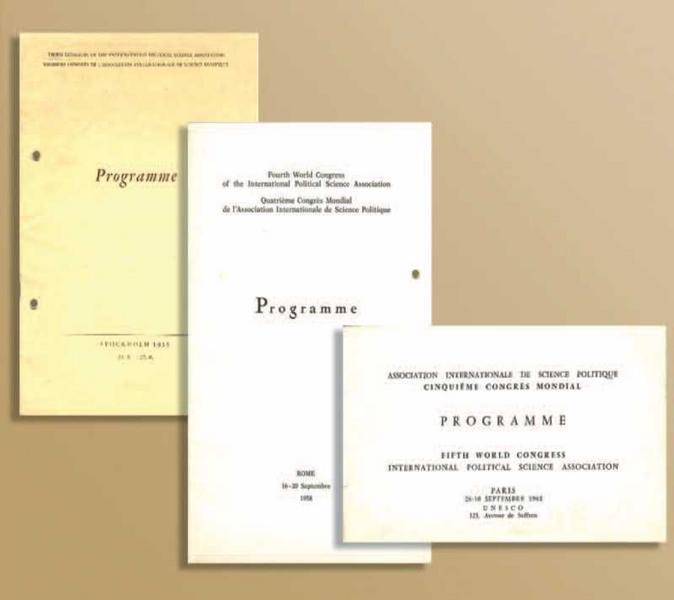
In late 1949, the committee and its Executive Secretary had to begin to put into place the structures that would enable the IPSA to take up the challenge laid out in its constitution: "[promoting] the advancement of political science throughout the world."11 The new Association thus had a single objective that entailed action on three fronts: building the organization, fostering the intellectual development of political science, and helping spread the discipline geographically.
Notes
1 Letter from Jean Meynaud to John Goormaghtigh, 22 September 1955. Translation.
2UNESCO, General Conference: First session, Paris, UNESCO, December 1946.
3 UNESCO, Records of the General Conference of Unesco, second session, Mexico, 1947. Paris, UNESCO, April 1948.
4 UNESCO, International Conference on: Methods in Political Science, 13 September 1948–16 September 1948. Statement issued by the members of the Conference, 16 September 1948. Paris, UNESCO, 28 April 1949.
5 Raymond Aron (France), the conference chairman, was an agrégé in philosophy. Frede Catsberg (Norway), Georges Langrod (Poland) and William A. Robson (United Kingdom) were all professors of public law. G.D.H. Cole (United Kingdom) was a professor of social and political theory. John Goormaghtigh (Belgium) was the director of an institute of international relations. M. Rathnaswami (India) was a university vice-chancellor. Only Walter R. Sharp (United States) held the title of professor of government.
6 "Students of politics… should, however, distinguish between the analysis of verifiable facts and the formulation of value judgments.… Frequent contacts between the political scientists of different countries would stimulate awareness of these factors." (UNESCO, International Conference on: Methods in Political Science, 13 September 1948–16 September 1948, op. cit.)
7 UNESCO, International Political Science Conference. Summary Record of the second meeting, held at Unesco House, 19 Avenue Kléber, Paris 16e on Monday, 12 September 1949 at 2.30 p.m. Paris, UNESCO, 25 October 1949.
8 UNESCO, International Political Science Conference. Summary Record of the third meeting, held at Unesco House, 19 Avenue Kléber, Paris 16e on Tuesday, 13 September 1949 at 10 a.m. Paris, UNESCO, 25 October 1949.
9 American Political Science Association, Resolution recommended by the Committee on IR and approved in principle by the Executive Committee, 29 December 1948.
10 Unesco, International political science conference. Provisional Executive Committee of the International Political Science Association. Summary record of the first meeting, held at Unesco House on Thursday, 15 September 1949 at 2.30 p.m. Paris, UNESCO, 25 October 1949.
11 UNESCO, Constitution of the International Political Science Association (Text adopted by the International Political Science Conference held at Unesco House, Paris, 12 to 16 September 1949), Paris, UNESCO, 10 October 1949.
Building the Association
The purely organizational development of the IPSA proceeded along two tracks. The internal track involved drawing up a blueprint for the organization and setting up structures that would allow it to operate in a well-regulated, effective fashion. The external track entailed obtaining recognition from other organizations in order to ensure the Association’s legitimacy.
2.1. Setting up the structures
I consider that, currently, the most important task of the secretariat is to facilitate the formation of national associations. The IPSA will only trulybecome a robust, living reality insofar as it is truly a federation of vigorous national associations.[Translation]
Jean Meynaud
Executive Secretary of the IPSA,
16 March 1950.
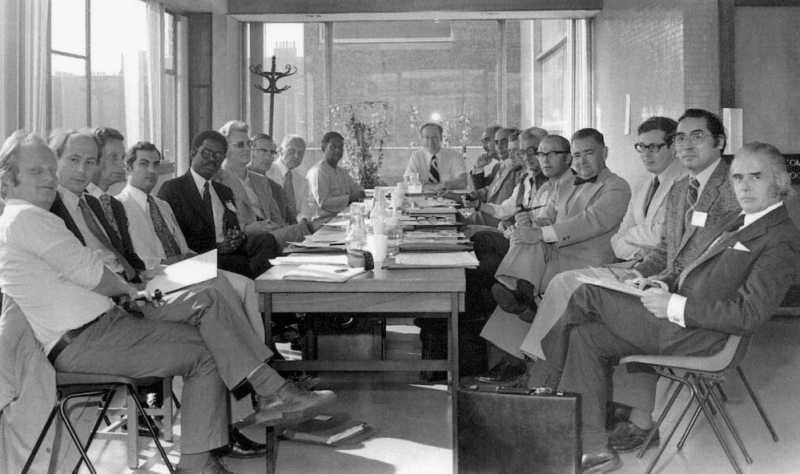
The first articles of the constitution passed by the 1949 conference set out the responsibilities of the IPSA’s basic organs, the Council and the Executive Committee. They are the classic structures most such associations adopt: the Council is the general assembly of the IPSA, and the Executive Committee is the board of directors, elected by the Council for a term of three years. Under the constitution, the Executive Committee appoints the Treasurer and Executive Secretary, while the Council names the President. Sixty years of practice have brought about changes in these arrangements. Election of the President has thus regularly taken the form of the validation of a proposal by the Executive Committee, and, over the past few years, the name put forward has often been that of the outgoing first vice president. Incidentally, the office of vice president is the only real institutional curiosity of the IPSA, notably because of the vagueness that surrounds it. The number of vice presidents has varied, the procedures for appointing them have changed, and the responsibilities of the office are poorly defined. It has thus been the subject of discussions and constitutional amendments. It has even, at times, led to controversy and tension. For example, James Pollock, President of the IPSA from 1955 to 1958, argued that vice presidents had no greater prerogatives than any other Executive Committee member.
Debate about the office of vice president has been particularly problematic and recurrent, but arguments have also arisen over the remit, election procedures, and composition of other IPSA organs. The issue of the structure of Association membership has always lain, more or less explicitly, at the root of these disputes. Although consensus was reached in 1949 on the admission of three categories of members—collective, individual and associate— the methods of admission and the respective weight of the groupings in the decision-making processes of the IPSA were by no means selfevident. The associate members, comprising all those groups “pursuing objectives compatible with those of the Association in related fields of activity,” did not really pose much of a problem. Since they were not represented on the Council and therefore not involved in any power issues, questions respecting them were easily settled. Matters regarding the collective and individual members, though, were more complex.
It was clear from the beginning that the purpose of the IPSA was to constitute a federation of national associations and that the collective members were consequently to have predominant power. However, this position of principle was at odds with the actual state of political science in 1949. There were only four national associations among the founding members, making it inevitable that individual members would be admitted and that they would furthermore be given some weight in decision making.
The first question was how much weight to give them. How many Council seats ought to be allotted to individual members, particularly as compared to the number allocated to the collective members? The participants of the 1949 conference responded with two compromises: First, they authorized significant representation of the individual members on the Council, on condition that it not be greater than the representation accorded the collective members.12 Secondly, they deferred formation of the Association Council until a later date when the membership would be deemed sufficient.
The participants in the 1949 Conference had not only to resolve the issue of decision-making power but also to define the criteria for membership. Given the permeability of the discipline, which we discussed earlier, how was one to determine which individual or collective candidates were actually in the field of political science? Furthermore, each category of members presented special problems: What if two associations from the same country applied for membership? What if an individual who had been rejected by a national association wanted to join the IPSA? Here too the participants evidenced flexibility and compromise. Some of them were leery of trying to define the characteristics of a bona fide political scientist. Such an undertaking would inevitably have led them to venture out onto the uncertain ground of defining political science, and, as we have seen, they had hitherto been extremely cautious in this regard. Others betrayed a fear that the lack of any criteria would lead to the politicization of the Association. For example, Quincy Wright, who would serve as the first president of the IPSA, maintained that “it was important at any cost not to exclude a bona fide candidate on the ground that he belonged to some ideological group.” When the discussion ended, the authority to examine candidacies was delegated, albeit with little conviction, to the Executive Committee. The only proviso was that the Committee do everything in its power not to admit more than one collective member per country in order to avoid overrepresentation of any region on the Council. Articles 7 and 8 of the constitution thus encouraged the grouping together of associations from a single country but did not make it mandatory:
Collective Members shall consist of national (and regional) associations recognized by the Executive Committee as being representative of political science in their respective countries (or regions).There shall normally be only one collective Member from a country, but if, in any country, two or more eligible groups are candidates for collective membership, the Executive Committee, at its discretion,… may seek the establishment of a joint committee to which the collective membership may be granted, or it may admit one or more of the groups as collective Members.
These initial precautions made later adjustments necessary, and the arrangements regarding the admission and representation of members were the subject of a number of discussions and even amendments. Debates on the boundaries of political science, the vagueness of the notion of the bona fide political scientist, and the IPSA’s relationship with real world politics would recur. For example, the Executive Committee had to deal on occasion with thorny candidacy issues, such as those, most notably, of the German and Soviet associations, to which we shall return below. The question of the composition of the Council also arose on a regular basis. The first time was in 1952 when the Council was finally constituted, and it was decided that the collective members be represented by from one to three political scientists per country; only the British, French, and American associations were allotted the maximum number of representatives. Later, in the 1970s, the increasing weight of the Research Committees in setting the scientific agenda for the IPSA was to justify their representation on the Council. The issue of the appropriate number of Executive Committee members was also the subject of recurrent debate, and a compromise had to be made between the goal of geographic representation and the realities of the cost of Committee meetings. On the one hand:
The interest of Political Science [lies] in its [intensive] regional expansion where the Executive Committee has an active role.. It is natural then for the Council to watch and see members of socialists [sic] countries, Africa, Latin America, Asia sitting next to members from Occidental countries.13
On the other hand, the cost of meetings would rise as the membership spread geographically.
Apart for such piecemeal adjustments, the IPSA’s decision-making structure has been remarkably stable over the sixty years of its existence. In contrast to the barely noticeable changes in political structure, though, there have been much more marked changes in the administration of the Association. From François Goguel (1949-1950) to Guy Lachapelle (2000 to present), the IPSA has evolved from a system of one-man management to a team-based organization with incomparably greater operational and financial resources at its disposal. This major shift merits further examination.
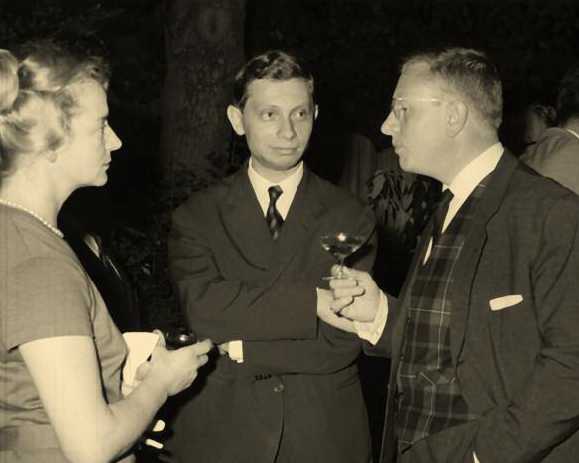
The first executive secretaries faced no easy task. Until the end of the 1960s, the operations of the IPSA rested largely on the shoulders of one person François Goguel (Fondation Nationale des Sciences Politiques (FNSP), Paris, 1949–1950), Jean Meynaud (FNSP, Paris, 1950–1955), John Goormaghtigh (Carnegie Endowment, Geneva, 1955–1960), and Serge Hurtig (FNSP, Paris, 1960–1967) each served concurrently as both Secretary General and Treasurer. They often made comments, sometimes leavened with humour, about how demanding the job was. Jean Meynaud thus wrote: “The IPSA Secretariat (a slightly pretentious term for one person who has to carry out all the everyday office work, including the mailing and filing) is currently working all out for the Congress at The Hague.” 14 Sometimes the comments betrayed more bitterness, as when John Goormaghtigh wrote: “Last year I wrote over 1400 letters for IPSA, not mentioning circular letters and mimeographed documents. This alone would be nothing if one could count on people replying to correspondence.” 15 The complaints are understandable considering that these men were only part-time employees of the IPSA. They were also political scientists and were engaged in teaching or running institutions such as the Carnegie Endowment (Goormaghtigh) or the Fondation Nationale des Sciences Politiques (Meynaud).
The result of concentrating the administration in the hands of a single person was to tie the operational facilities of the IPSA to the position of its Executive Secretary in his base institution. Jean Meynaud thus used his secretary at the Fondation for Association work and even used the FNSP’s stationery for his IPSA correspondence.
The fact that the secretariat was essentially one person had a symbolic as well as an operational impact. It added to the burden that successive Executive Secretaries bore by turning them into the incarnation and institutional memory of the IPSA. This development was partly due to the fact that they held the job for such a long time. Except for François Goguel, who was a special case, they stayed in their post for at least five (Jean Meynaud, John Goormaghtigh) and as many as twelve years (John Trent)—far longer than the three-year term of the President of the Association. Furthermore, their involvement in the IPSA was not restricted to their term as Secretary. Jean Meynaud was a member of the Executive Committee from 1955 to 1958. John Goormaghtigh was involved from the very beginning as one of the founding members. John Trent was chairman of Research.
The secretariat’s symbolic importance also stemmed from its crucial historic role in the growth of the Association. As the excerpt from the letter from Jean Meynaud that introduces this chapter illustrates, the Executive Secretary played a proactive role in the development of international political science by sending vast numbers of letters to every corner of the world in search of “National Associations or simply groups representing specialists in political science.” 16 The sea or ocean that lay between the President and Secretariat of the IPSA for the first nine years of its existence furthermore led the Executive Secretary to consult the President only on particularly sensitive or political issues and to de facto extend his own prerogatives.
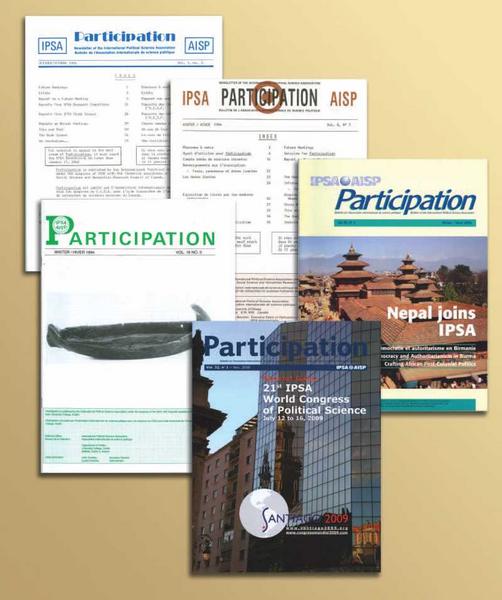
Not until the late 1960s did the Executive Secretary begin to acquire more resources to carry out his mission. André Philippart (Université Libre de Bruxelles, 1967–1976), John Trent (University of Ottawa, 1976–1988), Francesco Kjellberg (University of Oslo, 1988–1994), John Coakley (University College, Dublin, 1994–2000), and Guy Lachapelle (Concordia University, Montreal, 2000 to present) now had the title of Secretary General. From 1962 on, they were assisted by a full-time administrator. This position has been held successively by Michèle David (1962–1967), Michèle Scohy (1967–1976), Liette Boucher (1976–1988), Lise Fog (1988–1994), Louise Delaney (1994–1998), Margaret Brindley (1998–2000), Christian Gohel (2001–2003), Stéphane Paquin (2003–2004), Aubert Descôteaux (2004–2007), and Andrea Cestaro (2007–2009). In 2000, when Guy Lachapelle assumed the post, a real team took over management of the Association. Two people could no longer handle the IPSA’s increased membership and extensive activities, which included organizing Congresses, Symposiums and Round Tables; managing the Web site; and publishing Participation (the IPSA bulletin). This critical development was notably made possible by the support of Montréal International, an organization based on a public-private partnership, one of whose goals is to attract international organizations to Montreal in order to enhance its international standing. 17
Only recently has the secretariat thus acquired the human and logistic resources it needs to fulfill the many prerogatives it has had since the Association was founded. Together with the effective, routinized operations of the Council and the Executive Committee and easier contact between the President and the Secretary due to the development of transport and telecommunications, these additional resources now provide the IPSA with all the internal components of a scientific organization in full working order. Furthermore, as we shall see, progress in its external relations has resulted in the transformation of its missions.
2.2. Obtaining external recognition
The new budget of [UNESCO’s] social science department seems to be much more directly geared to technical assistance to states.… What is more, it must be admitted that the subjects selected by the social science department have more to do with the socio-psychological disciplines than with traditional studies in political science, law or economics. Once again, we can bear out the serious consequences of the fact that no political scientist, no economist worthy of the name, is on the staff of the department, which is dominated entirely by individuals with a sociological bent… not to mention by out and out ignoramuses.[Translation]
Jean Meynaud
Executive Secretary of the IPSA,
20 July 1954.
While the IPSA cooperated with a number of organizations, UNESCO, naturally enough had a special place in its external relations. As the Association’s mother institution, UNESCO has been both a resource and a source of tension. In the former role, it has, first and foremost, been a funding agency. UNESCO was thus not only the prime mover behind the meetings of 1948 and 1949 but was also responsible for bringing political scientists from a number of countries to them. During the IPSA’s early years, the bulk of its funding came from UNESCO through the International Social Science Council, a body to which we shall return later. These financial contributions were doubtless welcomed by the Association’s Executive Committee. However, they also stoked fears for the independence of researchers who were being largely funded by a political organization. Raymond Aron gave voice to these fears very early on when he “indicated, and was very insistent on the point, [that the IPSA] should not be a dependent organization of UNESCO but an autonomous Association that simply enjoyed its patronage.”18 UNESCO showed itself sensitive to these concerns when its Director-General, Jaime Torres Bodet, declared that the “creation of associations like those you are contemplating seems to Unesco to be the best way of helping scientists to work together without unduly limiting their freedom of action.” 19
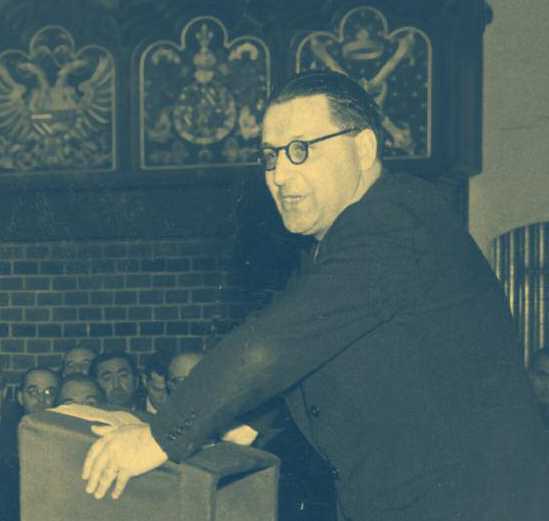 Relations between the IPSA and UNESCO would long be marked by an underlying tension between financial need and fear of domination. This tension was reflected in the comments made by an irritated Jean Meynaud to Marcel Bridel on 4 February 1952:
Relations between the IPSA and UNESCO would long be marked by an underlying tension between financial need and fear of domination. This tension was reflected in the comments made by an irritated Jean Meynaud to Marcel Bridel on 4 February 1952:
I understand perfectly your feelings regarding Unesco’s working methods. I personally share them, probably even more strongly. The most awful thing about the place is the uncertainty of the final outcome… All that is obviously disappointing and, all things considered, rather annoying. The time wasted on legwork and phone calls would be so much better spent on more substantive work. [Translation]
Financial independence was therefore a priority of Executive Committees and Secretaries of the Association from the start: “I do not want an association which should remain really international from every standpoint to rely solely on a single source of funding. That’s why I’m trying to expand our financial base as much as possible.” 20 Achieving this goal was no easy task, though, for unlike other academic organizations such as the European Consortium for Political Research (ECPR), the IPSA membership on its own did not have the financial capacity to support the Association’s development. Apart from the American Political Science Association, the funding available to the national associations (the collective members) was so limited by their all-toosmall memberships that in 1976 an equalization fund was established to help the poorer ones.
Attempts to obtain alternative financing from major American and other foundations bore only occasional fruit (from Ford, Volkswagen, and Rockefeller) but no long-term grants. The IPSA thus long had to cope with structural budgetary problems that sometimes impinged directly on its activities. Thus, in the 1950s, meetings of all the members of the Executive Committee were rarely possible because the travel expenses for non-Europeans were simply too onerous. In late 1952, money was so tight that Jean Meynaud had to suspend taking his salary. In 1963, faced with the high costs of organizing the 1964 Congress, Serge Hurtig suggested saving money by not paying the travel expenses of the members of the Executive Committee; this problem was eventually settled by raising the registration fees. In the late 1970s and early 1980s, the bold endeavors of the Moscow and Rio de Janeiro Congresses left the IPSA in deficit for an extended period.
It was only from the early 1990s, when a Committee on Financial Structure was established within the Executive Committee, that the Association ceased operating on the basis of an ongoing deficit that would be periodically covered. This long-sought stability was due to the increasing financial viability of the Association’s activities. The International Political Science Abstracts and the International Political Science Review (IPSR) ran surpluses; major sponsorships helped fund some of the World Congresses in the 1990s and 2000s; and the secretariat benefited from the partnership with Montréal International. It was, indeed, high time the Association attained financial stability, considering the change of philosophy at UNESCO regarding international associations; from 1995 on, the system of permanent annual grants gave way to project-based funding.This financial viability, acquired after a long struggle, combined with a more stable political and administrative structure to create the image of an Association with solid organizational foundations. Today, the IPSA thus has the institutional resources it needs to fulfill its various missions. Although this critical development has been dealt with in isolation here, it was clearly integrally related to developments on the scientific and geographic fronts, and it is to these that we shall now turn our attention.
Notes
12 Under Article 11 of Constitution the Council is made up of representatives of the collective members and of “individual Members of the Association designated by the Executive Committee from countries or regions where there is no collective Member, provided that such individual Members shall not exceed the total number of representatives of collective Members on the Council.” (ibid.)
13 IPSA, Council Meeting–Montreal, August 19th, 23rd, 24th, 1973.
14 Letter from Jean Meynaud to William A. Robson, 11 February 1952. Translation.
15 Letter from John Goormaghtigh to James Pollock, 8 January 1958.
16 Letters from Jean Meynaud to various addressees, March–May 1950.
17 The mission of Montréal International (MI) is to contribute to the economic development of Metropolitan Montreal and increase the region's international status. The realization of this general objective involves action on five mandates: increasing direct foreign investment, facilitating the relocation of strategic foreign workers, supporting the development of innovation, accelerating the development of strategic clusters, and increasing the presence of international organizations. It was this last mandate that led MI to support the IPSA’s move to Montreal. The Association is not alone, however, in benefitting from MI’s support, and it is now advancing in company with some sixty international organizations, such as the eminent Institut de Coopération pour l’Education des Adultes (ICEA), the International Civil Aviation Organization (ICAO), and the World Anti-Doping Agency (WADA).
18 Association Française de Science Politique, Réunion d’information relative à la constitution d’une association française de science politique, Paris, 6 November 1948.
19 UNESCO, International Political Science Association Conference. Summary Record of the first meeting held at Unesco House, 19 Aavenue Kléber, Paris 16e, on 12 September 1949 at 11 a.m. Paris, UNESCO, 25 October 1949.
20 Letter from John Goormaghtigh to Kazimierz Szczerba-Likiernik, 23 December 1955. Translation.
Contributing to the Intellectual Advancement of Political Science
Over the course of its history, the IPSA has striven to attain two objectives: to spread political science as widely as possible geographically (a subject we shall deal with in the third part of this survey) and to contribute to the intellectual development of the discipline. With regard to this second point, the Association’s concern was to help ensure the legitimacy and autonomy of political science with respect both to other disciplines and the political world.
When we undertook to deal with ideologies, it was understood that the subject would interest the department [of social sciences of UNESCO] and that we would get a grant. Meanwhile, unfortunately, the department head changed, and the new head said the subject was of no interest [to anyone] outside the small circle of the IPSA! At that point, [the department director] Mrs. Myrdal urged us to study local government, but since local government had not been the subject of a resolution 3.36 or 4.72, there was no possibility of finding the least bit of financing for it. In the end, we were left with the political role of women, a subject I have to say I’m far from keen on, but which UNESCO thinks justifies making large grants.[Translation]
Jean Meynaud
Executive Secretary, 4 February1952.
3.1. Attaining disciplinary and political autonomy
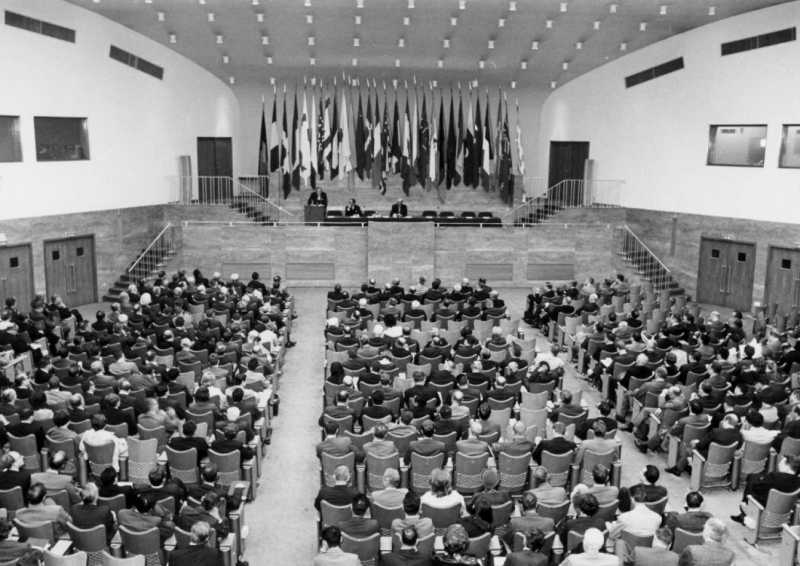
The IPSA’s financial dependence on UNESCO put it in a delicate situation in terms of its intellectual orientations. It had to submit to the ideas, goals, and missions of its sponsoring agency, while trying gradually to gain acceptance of its own conceptions of the program, methods, and epistemology of political science. The IPSA thus stood poised between a funding agency with political objectives and a research community with scientific ambitions.
The movement towards autonomy first entailed a break with the positivist epistemology inspired by the natural sciences that UNESCO associated with the social sciences in the early years. The IPSA tended to react with annoyance to these epistemological prescriptions, as illustrated by the following comment by Jean Meynaud to Kazimierz Szczerba-Likiernik of UNESCO’s social science department on 4 September 1952:
In conclusion, I’d like to make one very friendly criticism. You kindly forwarded your proposals for a document drawn up for the natural sciences department. I read the document without deriving any benefit from it, and I was sorry for the time I wasted on it. At the present stage, the needs and problems of the social sciences are completely novel and specific to them. People in the hard sciences tend to attribute universal value to their arguments and contributions. For once, I’d like the department of social sciences to stop encouraging this extremely futile tendency and leave it to us to decide what suits the disciplines we are responsible for. [Translation]
The relationship with the natural sciences was a minor problem, though, in comparison to the more recurrent question of the autonomy of political science vis-à-vis the other social sciences. As we have seen, autonomy was a core issue in the IPSA project as early as the meeting of 1948, and it resurfaced repeatedly in the early years of the Association.
The political scientists’ wish to set themselves apart from the jurists, historians, and philosophers often took on the tones of a dispute between Moderns promoting an autonomous discipline and Ancients who had reservations about the new techniques of “positive observation.” 21 These disputes periodically gave rise to tensions. For example, in 1952, UNESCO decided to delegate management of its relations with the new international social science associations to the International Social Science Council (ISSC). Understandably, given UNESCO’s role as the principal—if not sole—source of funding for the new associations, a power struggle was bound to erupt over the selection of the ISSC’s secretary general. The IPSA viewed the appointment of a sociologist as dangerous, since sociology was perceived as a discipline with hegemonic pretensions that were hardly compatible with the attainment of autonomy by political science. The Association also opposed the nomination of Claude Lévi-Strauss, who was seen as dangerous on the grounds of his philosophical education:
His training was the agrégation of philosophy, which in France is considered one of the main handicaps to the development of social sciences. He then turned to anthropology and has written a most remarkable book which I believe is on the elementary structures of family relationships. All this does not make him capable of promoting efficiently political science or economics. Lévi-Strauss belongs to those who do not consider political science a real science. Without any doubt, the political aspects of the contemporary world would be neglected by the council if he were appointed to this position. 22
In the end, Lévi-Strauss was nonetheless named Secretary General of the ISSC.
Similar tensions arose with even greater frequency with regard to the field of law. The most spectacular clash occurred in the ranks of the IPSA itself in the late 1950s during preparations for the Rome Congress (1958). They involved the choice of general rapporteur on the topic of “Executive-Legislative relations.” When François Goguel, who was originally sounded out to take on the role, withdrew, John Goormaghtigh, the Executive Secretary, took it upon himself to ask Georges Vedel. The choice roused strong opposition from the President of the IPSA, James Pollock.
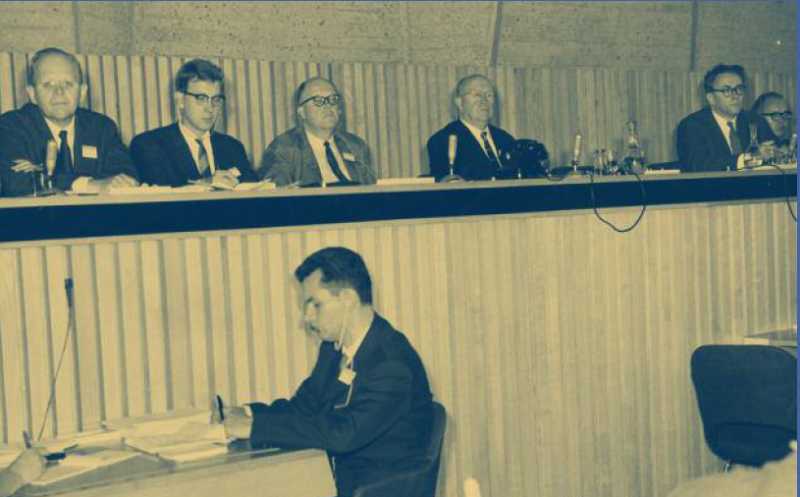 In his opinion, it was out of the question to invite someone with a background in law to occupy such a prominent role at a political science conference. Very curt letters were exchanged, and it took a fit of anger by Vice President Maurice Duverger and a threat to resign by John Goormaghtigh for Pollock to concede.
In his opinion, it was out of the question to invite someone with a background in law to occupy such a prominent role at a political science conference. Very curt letters were exchanged, and it took a fit of anger by Vice President Maurice Duverger and a threat to resign by John Goormaghtigh for Pollock to concede.
As time passed, tensions between political science and other disciplines arose less and less often. The explanation for the change is the usual one: the boundaries between the social sciences had gradually become routinized, and succeeding generations normalized the situation. Accordingly, the occasional encroachment by one discipline on the turf of another was decreasingly perceived as a threat to its autonomy.
While relations between political science and the other social sciences were difficult, the ties to the political world were rather ambiguous. The IPSA was, of course, obliged to maintain these relations because of the financial support provided by UNESCO. In exchange for its assistance, the United Nations Educational, Scientific and Cultural Organization exerted a degree of control over the IPSA’s activities. Clearly, it was in the Association’s strategic interest to attach itself to UNESCO’s political program as best it could, even if doing so sometimes meant agreeing to conduct studies of dubious scientific interest. The gamble the Association was making was that “sometimes you can manage to do something useful with less reasonable projects: it all depends on the people that UNESCO puts in charge of carrying out the projects.” 23 At UNESCO’s behest, the IPSA thus contributed to studies on such subjects as “the role of ethnic minorities in international relations” (1950), the “minimum conditions for an effective and permanent Union of States” (1950), and “the political role of women” (1952). However, as the Association became financially autonomous, it gained greater control over its own program. Its control became complete in 1995, when UNESCO decided to provide only project-based funding to the international associations. The IPSA’s links to politics were not, however, restricted to the variable influence that UNESCO exerted on its scientific program. Many Executive Committee members were politically active at the same time as they conducted their scientific activities, especially in the 1950s. For example, Fehti Celikbas was elected to the Turkish Assembly during his term on the Executive Committee, while Gunnar Heckscher, a leading member of the Swedish right-wing party, the Högerpartiet, would probably have become President of the IPSA in 1958 had he not been elected to his country’s parliament a year earlier. Paradoxically, participation in politics—in contrast to relations with the other social sciences—was rather highly valued and considered an opportunity to develop the discipline. To become a politician was to cross to “the other side of the barricades” and possibly gain access to more resources than were available to the “ordinary” political scientist, who was limited by his membership in academe.24 So critical was the contribution deemed, that little mind was paid to the difficulties that might be caused by a political world that was sometimes quite unaccommodating to these “double agents.” For example, France’s Direction Générale des Relations Culturelles refused Maurice Duverger and Roger Pinto financial assistance to take part in the IPSA Round Table in Florence on the—evidently tacit—grounds of the political positions they took regarding the European Defense Community (EDC).25 In 1958, the Association’s operations were disturbed by Maurice Duverger’s absence from the Rome Congress; he had stayed in France to campaign against the constitution of the Fifth Republic. 26
Highly valued though they might be, the presence of politics inside the Executive Committee through the dual role played by some of the members gradually faded and became more occasional. However, this general trend to professionalization on the part of the academics did not, as we shall see, mean that politics were no longer a factor in discussions about the admission of members or the choice of venue for a Congress.
The attainment of autonomous status through the process we have just described of distancing the discipline from both politics and the other social sciences has a major flaw: it makes political science out to be a field that essentially defines itself in negative terms. For a more complete picture, we must also recognize the IPSA’s proactive role in organizing scientific activities and thus contributing to a more “positive” definition of the discipline.
3.2. Promoting political science through a range of activities
Any Programme Committee for a world congress is cross-pressured. On the one hand, there is a demand to cater to practically every speciality in the discipline and, on the other, there is the need to focus on relevant themes.
Serge Hurtig
Editor of International Political Science Abstracts,
9 January 1980.
The IPSA contributed to the development of political science through a very wide range of activities. The first such undertakings were major studies commissioned by UNESCO that were aimed as much at drawing up an “inventory” of the discipline as at contributing to its growth. Raymond Aron’s “methods in political science” project, which was discussed earlier, laid the foundations for the establishment of the Association. In contrast to the epistemological concerns of that study, the second project, “the teaching of political science,” dealt with more “concrete” matters and focused on university programs. Under the coordination of general rapporteur William A. Robson, who later served as President of the IPSA (1952–1955), the study provided an exhaustive account of the history of academic political science in Sweden, the United Kingdom, the United States, France, Canada, India, Mexico, Poland, Germany, and Egypt. This inventory of recruitment and teaching methods, of the content of syllabuses and degrees, and of the linkage between teaching and research enabled the IPSA to take the measure of the obstacles it would have to overcome in order to attain its goal of harmonization.
These major studies were, however, exceptional in that they were not repeated on a regular basis over the course of the Association’s history. Indeed, the IPSA’s routine activities did not involve large-scale multinational investigations of this type. They centered rather on the organization of academic events, primarily the World Congresses. Over the years, not only has attendance at these triennial gatherings grown—from 88 or so delegates at the Zurich Congress in 1950 to more than 2000 at Fukuoka in 2006—but the philosophy behind them and the way they are organized have evolved. At the first Congresses, presentations and discussion revolved around two or three selected topics, and general rapporteurs were assigned the tasks of organizing and synthesizing them. However, increasing participation and the emergence of the Research Committees made it difficult to structure proceedings around a limited number of rather specific subjects. Change came with the 1976 Edinburgh Congress. Since then, the chair of the Program Committee has been responsible for organizing the event around one broad, inclusive theme, although a number of independent sessions are set aside for the Research Committees and off-theme papers. The themes selected have been “Time, space and politics” (1976); “Peace, development, knowledge” (1979); “Society beyond the State in the ‘80s” (1982); “The Changing State & Its Interaction With National & International Society” (1985); “Towards a Global Political Science” (1988); “Centers and peripheries in contemporary politics” (1991); “Democratization” (1994); “Conflict and order” (1997); “World capitalism, governance and community” (2000); “Democracy, Tolerance, Justice: Challenges for Political Change” (2003); “Is democracy working?” (2006); and “Global Discontent? Dilemmas of change” (2009). As the statement by Serge Hurtig heading this chapter illustrates, drawing up the program for a World Congress is a delicate exercise: dilemmas often arise between the specific and the universal and between “classic” and innovative political science.
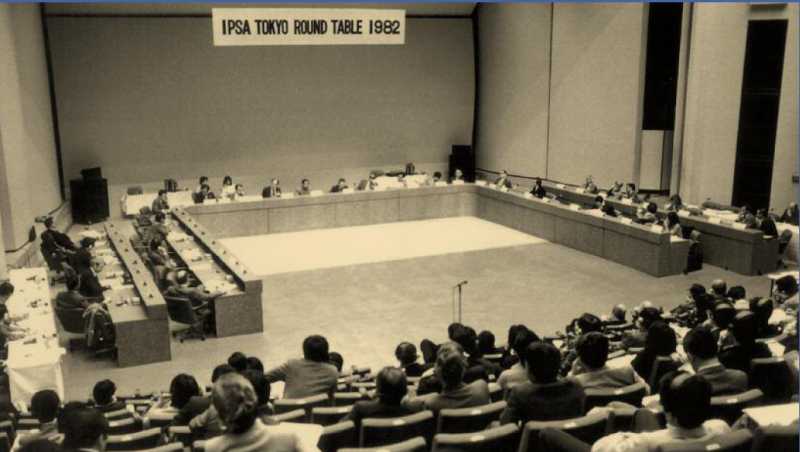
The goals of the Congresses, while partly scientific, are primarily social. Certainly, as Francesco Kjellberg, the Program Committee chair in 1985 and Secretary General from 1988 to 1994, declared, a Congress must “contribute to the strengthening of the comparative aspects of our discipline,” “remind us of the unity of political science,” and “contribute to the rejuvenation of political scientists.” 27 But it must primarily be a locus for exchange and interaction:
The purpose of a Congress like the one we are preparing is to develop interest in political science just about everywhere in the world. We have included a number of scientific themes in our study program and, of course, we hope to obtain valid findings for each of the themes. But scientific work is not the sole aim of an International Congress. Another one is to enable personalities from countries with different cultures to meet, make contacts and thus become aware of their strengths and weaknesses. 28
Important though the World Congresses may be in the life and history of the International Political Science Association, they are not its sole scientific endeavor. Between Congresses, meetings of the Executive Committee have often led to the organization of Round Tables. The first such event was held at Cambridge in 1952 in relation to William A. Robson’s “teaching of political science” study. Since then, Round Tables have been organized on a more or less annual basis. At first, the subjects tended to be rather broad and prefigure one of the themes of the next Congress. However, as the discipline became more specialized and fragmented and, correlatively, as the Research Committees and Study Groups developed, the topics became more specific. The choice of venue for Round Tables has tended to anticipate the location of future Congresses; holding a Round Table gave the Executive Committee an opportunity to evaluate the host university’s ability to organize a larger-scale event.
More recently, the IPSA has added regular symposiums to the events that it organizes. Falling somewhere between Round Tables and Congresses in terms of scale and level of specificity, they are structured around a single theme and allow the Association to “show the flag” between Congresses. The approach behind them is to take an inventory of knowledge on a subject. Symposium topics have included “Elections and party systems in contemporary democracies” (1993); “The challenge of regime transformation: New Politics in Central and Eastern Europe” (1996); “Globalization and the future of nations and states” (1998); “Ethnicity in the first world, the third world and ex-communist countries” (2000); “Mastering globalization: new states’ strategies” (2002); “Democracy and political party financing” (2003); “Web portals for social sciences” (2005); “Cultural diversity, identities and globalization” (2007); and “International Political Science: New Theoretical and Regional Perspectives” (2008).
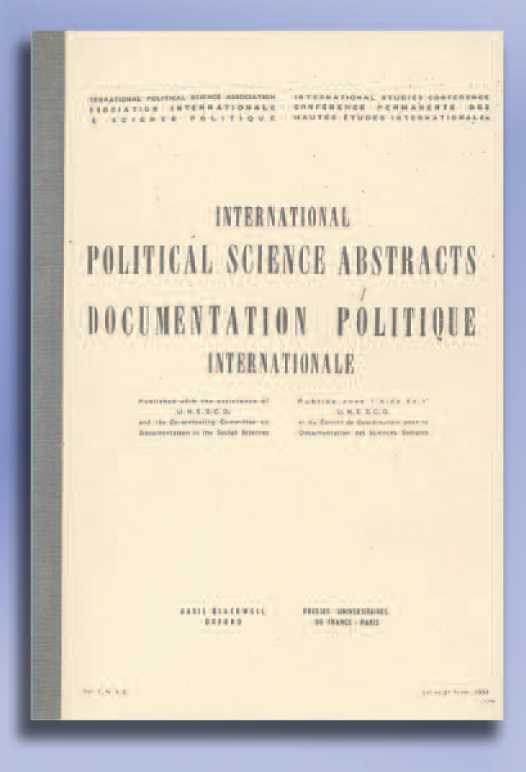
In addition to organizing these events, the IPSA has contributed to the intellectual advancement of political science through its two flagship publications: the International Political Science Abstracts and the International Political Science Review (IPSR). The Abstracts first appeared in 1951, long before the Review, under the direction of Jean Meyriat, who was Secretary General of the International Council for Social Sciences (ICSS) (another organization whose creation was fostered by UNESCO) and head of the Fondation Nationale des Sciences Politiques documentation department. The IPSA and the ICSS also jointly published the International Bibliography of Political Science (IBPS) until it broke away from the IPSA in 1955 and finally ceased publication in 1987. Like the IBPS, the Abstracts took an inventory approach, though in a slightly different form. The IBPS was an annual, and its objective was to compile a list of the main political science publications— both books and articles—that had appeared over the previous year. The International Political Science Abstracts publishes the abstracts of articles from selected political science journals, indexes them and classifies them under six main categories:
I/ Political science: method and theory;
II/ Political thinkers and ideas;
III/ Governmental and administrative institutions;
IV/ Political process: public opinion, attitudes, parties, forces,
groups and elections;
V/ International relations;
VI/ National and area studies.
The Abstracts currently cover nearly a thousand journals and publish more than 8,000 abstracts a year, adding to a database of 264,000 references going back to 1951. The Abstracts have established themselves as an essential bibliographic resource and a financially viable undertaking for the IPSA. The periodical’s success is largely due to one person, Serge Hurtig, who succeeded Meyriat in 1963 and has edited the publication for 45 years. Since 2001, he has shared his duties with Paul Godt, who has in turn succeeded him at the head of the publication.
It was not until the late 1970s, long after the Abstracts first came out, that the IPSA really contemplated publishing an International Political Science Review. Ajournal had figured in the projected program of the future organization as early as 1949. The rather surprising delay in implementing the idea is due the fact that for a long time UNESCO put part of its own journal, the International Social Science Bulletin (later the International Social Science Review) at the disposal of the IPSA. Furthermore, organizing Congresses was so demanding an exercise that the secretariat did not have time for so major an undertaking as the publication of a journal. There were ultimately two main reasons why the IPSR was launched in 1980. One was, of course, like the Association itself, to help “bridge [the] gap between countries, ideologies and specialized areas” of political science. More importantly, though, the periodical was to provide an outlet for the high-caliber papers presented at the IPSA’s Congresses and other scientific gatherings. 29
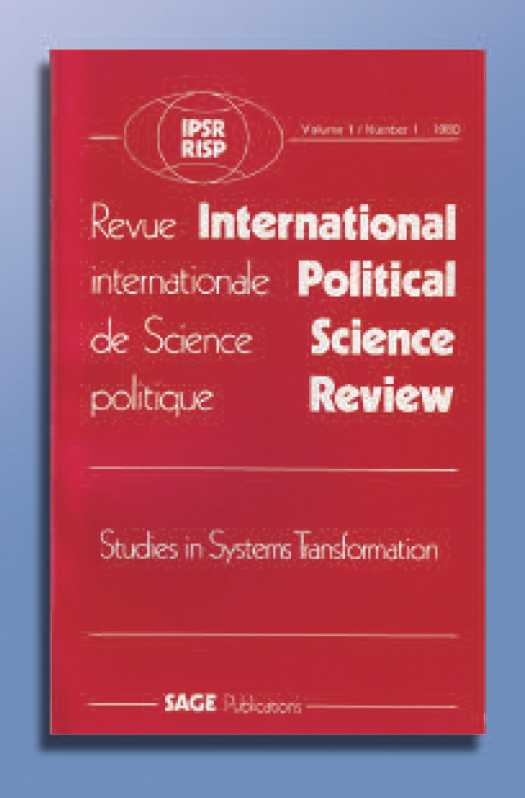
The Review is distinctive in that, from the outset, it adopted the format of guest-edited, themed issues. Judging by the IPSR’s improving financial health and high impact factor, the approach has paid off. Despite a higher turnover than at the Abstracts, the journal’s success is most notably due to the long terms of its editors and co-editors: John Meisel (1980–1996), Jean Laponce (1986–2002), Nazli Choucri (1995–2001), James Meadowcroft (2000–2007), Kay Lawson (2001–2009), and Yvonne Galligan (2007–2009).
In addition to the periodicals, since its inception the Association has also commissioned and helped bring out books. During the first thirty years of the IPSA’s operations, there was no long-term book program. There were ad hoc publications based on the work of rapporteurs at Congresses or Round Tables and on studies commissioned by UNESCO. Different publishing houses were used. The books included William A. Robson’s Study of teaching, La participation des femmes à la vie politique by Maurice Duverger (1955), New states and international organizations by Benjamin Akzin (1955), and numerous later works. Not until the early 1980s did the IPSA undertake to bring these assorted publications together under a single banner with the launch of Advances in political science: an international series edited by Richard L. Merritt, who chaired the Program Committee of the 1979 World Congress. Partnerships with a succession of publishing houses proved quite unstable; Sage, Butterworth and Cambridge University Press were each involved in the collection during its first ten years. A new startup was necessary, and a partnership was established with MacMillan in 1995. Since then the collection has grown to several dozen books.
In addition to this “main” series, many books have been produced by the Association’s Research Committees and Study Groups over the years. It is through these two types of groups, more than any other, that the IPSA has taken the initiative and been proactive in producing original research. Stein Rokkan, the vice president of the International Sociological Association (ISA) from 1966 to 1970 and President of the IPSA from 1970 to 1973 suggested “setting up permanent committees that would be responsible for following up the research in a number of fields” 30 as early as 1961. The plan was not put into effect until 1970, but it soon proved a success. On 24 August 1973, three years after the system was set up, the Council unanimously paid tribute to the work of the eight groups that had been given Committee status: their work “spread out and [stressed] the action of [the] IPSA” and “is in itself a proof of the vitality of the Association and a good way to decentralize the scientific activities.”
Three years and two new Committees later, two decisions were made. First, Specialist Groups were established with a status halfway between that of an informal network and a Research Committee so that groups could “prove themselves” before being granted a higher level of institutional recognition. Second, a sub-committee was appointed to study the possibility of giving the Research Committees representation on the IPSA Council.
Three years later, the sub-committee’s work resulted in an amendment to the Association’s constitution. The dynamism of the two types of transnational networks has led to the decentralization of the IPSA’s scientific endeavors to such a point that it now fulfills little more than a “job as a clearing house.” 31 It is consequently difficult to assess the impact of the Groups’ and Committees’ studies on the intellectual development of political science. In organizational terms, the experience has clearly been a success: forty years after they were first set up, there are now fifty active Research Committees in the IPSA. 32
Finally, mention must also be made of the IPSA Portal. With this latest initiative, the Association takes notice of the growing role that the Internet plays in the activities of political scientists. Headed by editor Mauro Calise, the Portal records, classifies, describes, and evaluates some 300 Websites useful to the practice of political science.
The IPSA’s numerous scientific activities are an affirmation of its ambitions for the intellectual development of the discipline. In the main, though, they have been a means to attain what the Association’s constitution proclaims as its main objective: the creation of the conditions for breaking through national boundaries so that a single community of political science researchers can emerge. It was the challenge of internationalization that, without doubt, gave rise to the most intense debates over the course of the 101 sessions of the Executive Committee.
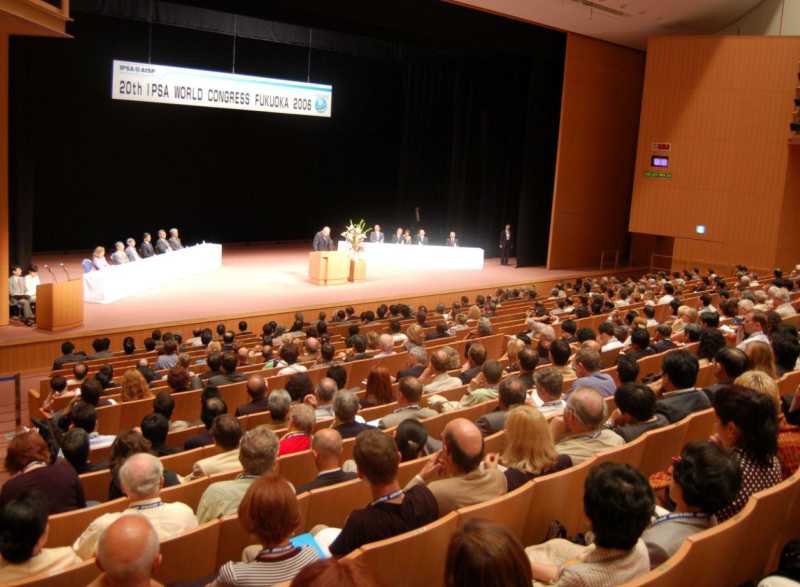
Notes
21 Letter from Jean Meynaud to Francesco Vito, 16 January 1951.
22 Letter from Jean Meynaud to Francesco Vito, 16 January 1951. Translation
23 Letter from Jean Meynaud to William A. Robson, 29 May 1952. Translation.
24 Letter from Jean Meynaud to Fehti Celikbas, 26 June 1950. Translation.
25 Letter from Jean Meynaud to William A. Robson, 12 February 1954.
26 Letter from John Goormaghtigh to Maurice Duverger, 19 August 1958.
27 Opening address by Francesco Kjellberg to the 1985 Paris Congress.
28 Letter from Jean Meynaud to Phedon Vegleris, 24 May 1952. Translation.
29 John Meisel, cited in the records of the IPSA Council meeting, 12 August 1979.
30 Letter from Serge Hurtig to Stein Rokkan, 14 December 1961. Translation.
31 IPSA, Executive Committee Meeting, August 25th 1973.
32 The distinction between Research Committees and Study Groups (which succeeded the Specialist Groups) was abolished in 1999. Only the single category of Research Committees remains, and new Committees have to go through a trial period.
Becoming International
The main and immediate effect of the IPSA’s international expansion beyond the Western world where it first developed was to politicize the process. Accepting one member or another, organizing a World Congress in one area or another involved making decisions that were often based on political more than on scientific considerations. We shall now turn our attention to the tightrope the Association has walked between these two often contradictory principles.
4.1. Expanding the membership across borders
1) In your country, is there a National Association or simply groups representing specialists in political science? I would like to make it clear that the term should be understood rather broadly and, in principle, should be considered to apply to professors of Public Law and Government as well. In the event that such a group exists, would it be possible for you to send me its address and the name of the people in charge?
2) Is it possible to obtain a list of the specialists in political science and public law in your country? [Translation]
Jean Meynaud
IPSA Executive Secretary, 16 March 1950.
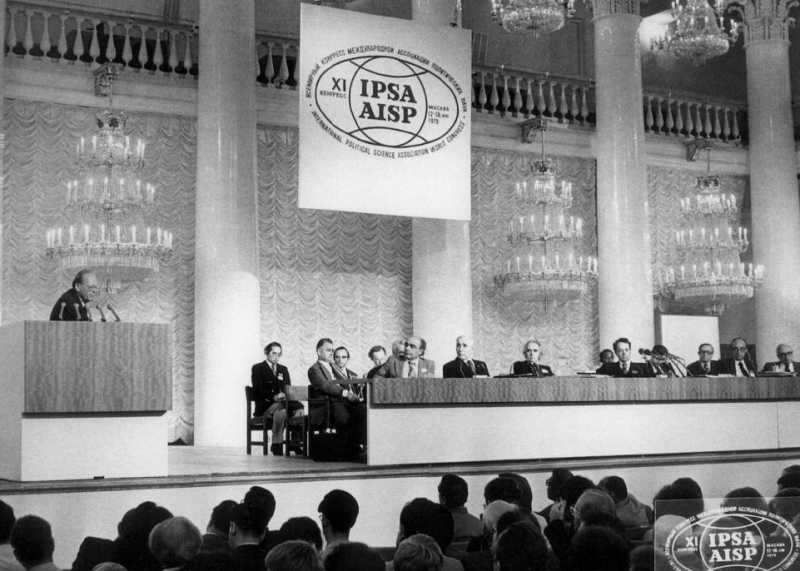
Those were the terms in which Jean Meynaud couched the standard letter that he sent to every corner of the world from March to May 1950. Australia, Denmark, Lebanon, Yugoslavia, Italy, Argentina, Brazil, Chile, Ecuador, Cuba, Peru, Venezuela, Colombia, South Africa, Hungary, Pakistan, Ireland, Japan, Uruguay, Finland, Portugal: few countries escaped this wave of correspondence. If Meynaud did not have the names of any political scientists for a particular country in his address book, he wrote to representatives of other disciplines and even to government ministers. He unwittingly demonstrated how little political scientists of different nationalities knew about each other at the time by writing to a former Finnish Minister of Justice, Tauno Suontausta, even though the Finnish Political Science Association had been in existence since 1935.
Meynaud’s wholesale canvassing bore fruit; by the end of 1955, the Association had no fewer than 23 collective members. The majority were from Western countries, with the notable exceptions of the national associations from India (a founding member), Israel, Mexico, Brazil, Japan, Poland, Yugoslavia, Australia, Cuba, Ceylon, and the Soviet Union. Since 1955 the expansion has continued, albeit at a slower pace, and in 2009 reached the symbolic mark of 50 collective members. However, this quantitative success was not achieved without controversy. For example, in 1952, the issue of German admission provoked an angry outcry from the Israeli Association, which had been a member since 1950. The IPSA too voiced some reservations and refused to admit the German Association without assurances that it would not admit any “personality involved in Nazism.”33 The admission process lasted nearly two years and required the presentation of various supporting documents by the German Association and a visit to Germany by the Executive Secretary of the IPSA. Only then did the International Association admit the Germans as a collective member.
The case of the Soviet Association aroused fiercer tensions even before a formal application was made. In late 1954, Jean Meynaud took it upon himself to invite representatives of the USSR to the following year’s World Congress in Stockholm. The initiative was immediately criticized by the then President, W. A. Robson:
I do not think we ought to invite participants to the Stockholm Congress from the USSR and other countries behind the iron curtain without the agreement of the Executive Committee of the IPSA. To invite representatives of the USSR for the first time raises a question of policy on which very strong opinions may be held both by member associations and by members of the Executive Committee. It is therefore necessary, in my opinion, that our colleagues should be given an opportunity to express their views before any action is taken. Not to consult them may provoke violent reactions and criticism from our colleagues and their associations.
Moreover, some political scientists may be unable to attend a Congress if official spokesmen of the USSR are present. 34
The affair not only revealed how permeable political science was to the international tensions of the period but also had an immediate impact on the operations of the IPSA when Jean Meynaud resigned as Executive Secretary after the Stockholm Congress.
The Soviet Association was ultimately admitted as a collective member, although the decision was not entirely of the IPSA’s doing. Russia’s entry into UNESCO made it rather awkward to keep the country out of an international association that had been established under UNESCO’s auspices. The Soviet case was only the first in a series of problems that arose in relation to the special political circumstances of Eastern Europe, as the account by André Philippart, the IPSA’s Secretary General from 1967 to 1976, illustrates (see below).
The IPSA and the East
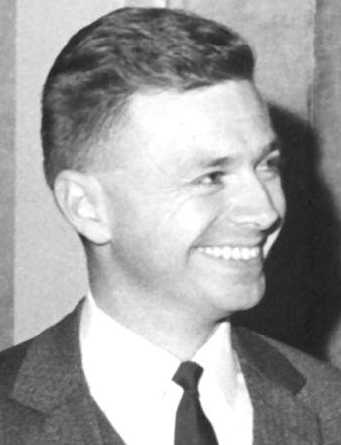
The period 1967–1973 was marked by the establishment of new political science associations in Eastern Europe, usually at the request of colleagues from the countries involved. In the main, they were jurists and professors of law who had ties to the regime but tended to express themselves “differently,”albeit with the usual caution. The USSR, Yugoslavia and Poland were already members and steered the admission process for countries under Soviet control. At Executive Committee meetings tensions ran high between Tchikvadze and Zivs (for the USSR) and, most notably, Karl Friedrich, Sam Finer, Jacques Freymond, Giovanni Sartori (who had replaced Mario Viora), and Alfred Grosser. Czechoslovakia had had a great deal of trouble before gaining admission in 1964, and Yugoslavia (via Pasic) did not inspire strong support. Poland’s Jerzy Wiatr took stands that differed from those of his compatriot Stanislaw Ehrlich. Jean Laponce and Kurt Sontheimer played the role of moderators.
Meeting in Salzburg in September 1968, the Executive Committee decided to hold a Round Table in Prague.The Prague Spring had just been ended by the Soviet military intervention (21 August 1968), and the Executive Committee resolved to immediately send a delegation led by the President, Karl Friedrich, and the Secretary General to gauge the political temperature there. In October 1968,we therefore made our way to a city under occupation.We could not make any of the contacts we had wanted and were trapped in our hotel. Still, the Executive Committee kept to its plans for the Round Table for 18–19 September 1969.
Alexander Dubcek’s “socialism with a human face” of 5 January 1968 was no more. The changes it had advocated—freedom of the press, expression, and movement, economic decentralization, and the establishment of a federal system— were abandoned.Gustav Husak had replaced Dubcek.Under the authority of the USSR, the Warsaw Pact powers of Bulgaria, Poland, Hungary, the GDR, and Albania (but not Romania) had overthrown President Svoboda. Janos Kadar assumed responsibility for “normalization”and used a column of tanks (from the Czechoslovak army) to suppress demonstrations in the center of Prague. The scholars that the IPSA had invited to attend had been dismissed and replaced by toadies of the new leadership. Still, the Round Table was held in Prague in September 1969 in hopes of alleviating the worsening repressive conditions. It did no good. André Philippart went on Czechoslovak television to explain why the IPSA was there, but it appeared as if he were backing the regime. Instead of translating what he said, the presenter delivered a monologue of his own.Led by a furious Sam Finer, the Round Table participants left the city.
Afterwards, the Brezhnev Doctrine made debate about the newly created national associations in Romania, Bulgaria, and Hungary more acrimonious. It was a distressing time, for in addition to the Warsaw Pact intervention, there were the events of May 1968 and the Vietnam War. Until the 1976 Edinburgh Congress, successive Executive Committees had to deal with the tensions these events had engendered between their members.An easing of tensions became apparent only with the Moscow Congress of 1979.The new leaders of the Soviet association were still close to the regime but had gradually acquired autonomy of a sort.There was an evident trend to freedom of expression, and the stage was being set for the Gorbachev era.
Stein Rokkan, Jean Laponce, and Karl Deutsch were very active and persuasive presidents during these changes. The International Political Science Association had played a by no means insignificant role thanks to its numerous contacts with the countries of Eastern Europe. André Philippart, for example, made 14 trips to Poland, Romania, Bulgaria, and Hungary to organize or support Round Tables by IPSA Research Committees.
André Philippart
Secretary General of the IPSA – 1967-1976
Another problematic case, which occurred much later, concerned China. In the mid-1980s the Taiwanese political science association indicated its intention to rejoin the IPSA. Immediately, tensions arose with China, which was already a member, over the name of the Taiwanese organization. The Taiwanese claim to the name “Chinese Political Science Association (Taipei)” was rejected by the association from the People’s Republic in the name of the One China policy. After years of sterile terminological debates and unsatisfactory compromises, in 1989 the IPSA Executive Committee agreed to admit Taiwan under the name “Chinese Political Science Association (Taipei),” but stated explicitly that the decision in no way constituted an infringement of the political principle of One China. Notwithstanding the Executive Committee’s stipulation, the Chinese Political Science Association protested and withdrew from the IPSA two years later. The International Association’s efforts to bring China back have so far been unsuccessful.
Geographic expansion entailed not only such ad hoc problems but also raised structural issues. In fact, as the Association’s base grew, the priorities of the Executive Committee changed. In the early years, the aim was primarily to achieve a critical mass of members. Later, the IPSA sought increasingly to manage expansion on the basis of geographic balance. Inspired largely by UNESCO’s “mania for geographic representation,” 35 this principle has had two consequences. First, it has led the Association to attempt to establish and maintain representation from every area of the world in all its structures and activities. Every continent has to be adequately represented everywhere, from the Council to the Executive Committee and from the Congresses to articles in the IPSR. Second, the geographic-representation principle has had an impact on the selection of cities to host IPSA events, inasmuch as organizing a Round Table, Congress or Symposium in one region or another of the world is seen as sending a message of encouragement or as an acknowledgment that the discipline has made advances there. In the final section of our survey, we shall therefore examine the policy that guides the choice of venue for Congresses.
4.2. Congress Policy
Unfortunately, none of the speakers who took the floor during the opening and closing sessions of the Congress saw fit to recall these elementary truths: that political science is not to be confused with political activism; that however justified the cause of friendship between peoples may be, it should never lead us to sacrifice the search for truth. [Translation]
Marcel Merle
IPSA Executive Committee member,
Le Monde,
21 August 1979.
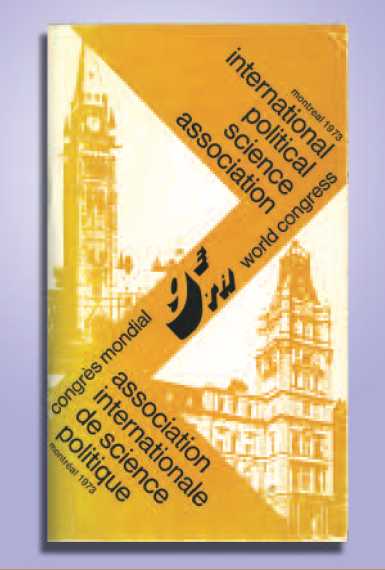
The principle of geographic balance has been a fundamental element of the IPSA’s policy in selecting Congress venues and helps explain why the Association was for so long hesitant to organize one in the United States. American political science loomed so large in the discipline that the Association sought to avoid reflecting US predominance in its own structures. Given the sheer numbers, the fear that “by force of circumstance, the Association would become a purely Anglo-Saxon affair” 36 was well founded. With over 10,000 members, the APSA potentially carried more weight than all the other national associations combined. Consequently, the first eight IPSA Congresses were held in Europe (Zürich 1950, The Hague 1952, Stockholm 1955, Rome 1958, Paris 1961, Geneva 1964, Brussels 1967, Munich 1970). Not until 1973 did the IPSA overcome its fears and hold its first Congress on the other side of the Atlantic. It was only after this first foray that the policy of rotation became more firmly established. After the 1976 Edinburgh Congress, rather bold decisions were thus made to hold Congresses in two non-Western locales: Moscow in 1979 and Rio de Janeiro in 1982. After returning to Europe in 1985 (and making Paris the only city to have hosted more than one World Congress), the IPSA underscored its decentralization by going to Washington (1988), Buenos Aires (1991), Berlin (1994) and Seoul (1997). The Congresses since the year 2000 constitute a consummation of a sort; each of the five cities—Quebec (2000), Durban (2003), Fukuoka (2006), Santiago (2009) and Madrid (2012)—represents a different continent.
The principle of geographic equality is so firmly ingrained in the Association’s procedures that every other consideration is secondary. Only the IPSA’s linguistic policy, which is also deeply rooted in its history, has similarly rarely been tinkered with. The Association has had a policy of French-English bilingualism since its inception 37, but has regularly had to face demands for the recognition of other languages as well: for example, at the 1955 Stockholm and 1958 Rome Congresses. Such claims have always been rejected to avoid setting a “dangerous precedent.” 38 Material, operational and financial issues have not been treated in the same principled fashion, however. The decisions to hold Congresses in Moscow, Rio de Janeiro, and Durban were not, in fact viable in these terms and aroused a great deal of opposition. The IPSA stood firm in all three cases, though, and was one of the first international scientific associations to break through the Iron Curtain and open itself up to the Third World and to going to Africa. The IPSA’s African experience even served as a model for the International Sociological Association, which went to Durban three years later.
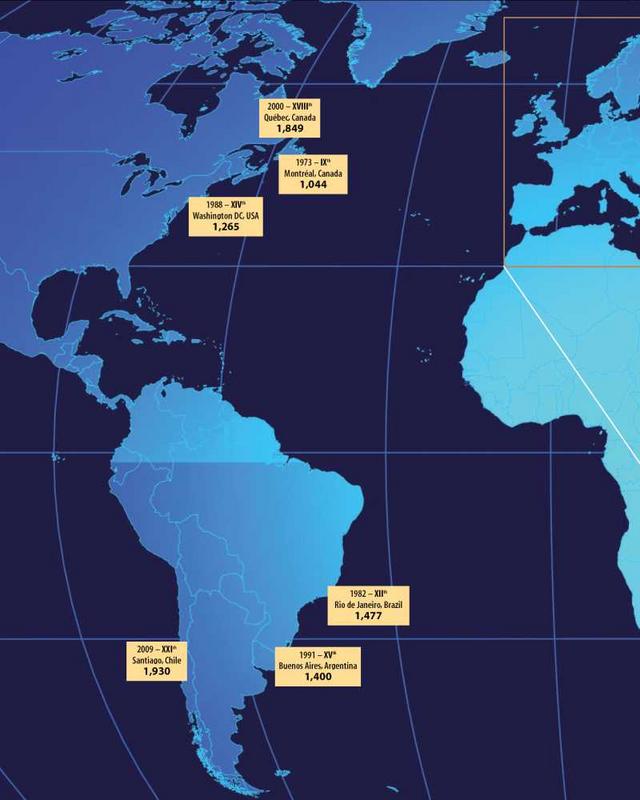
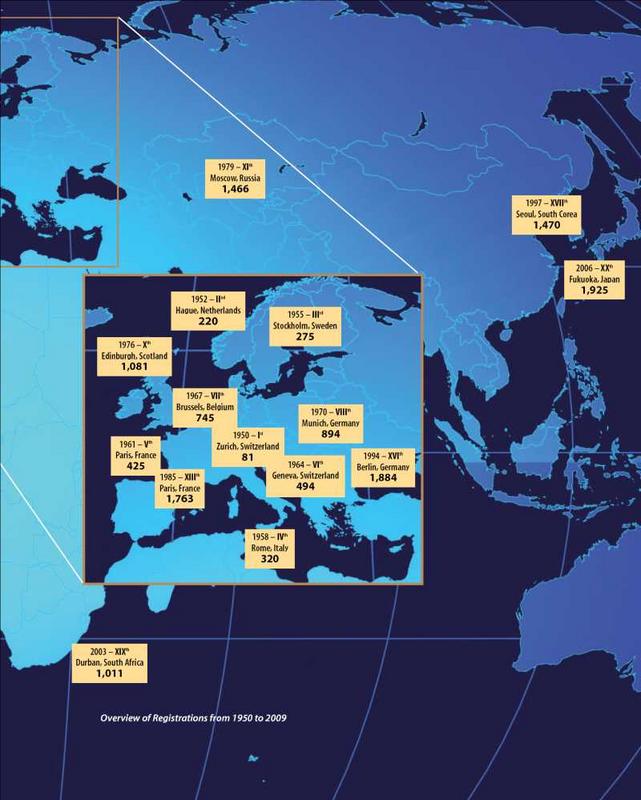
The Russian, Brazilian, and South African examples also prove that political considerations are not decisive in selecting a region to host a Congress. On the contrary, political conflicts are almost an incentive for such events since the Association wants, above all, to show that dialogue between political scientists is not constrained by diversity. To be sure, the controversial aspects of such decisions have not been ignored, but, as the Moscow example shows, they do not determine the choice.
The IPSA made a bold decision in crossing the Iron Curtain. It was one of the first international organizations to hold one of its flagship events on Soviet territory. The fact that the Association’s field of study is politics, a very sensitive subject, raised the level of tension even higher. The sides in the debate very quickly took up their positions. Those who opposed a Congress in Moscow saw it as legitimizing the Soviet regime in a way. The supporters of the Russian venue saw it either as a heuristic necessity that should not be hijacked politically or as a contribution to efforts to convert the USSR to Western values.
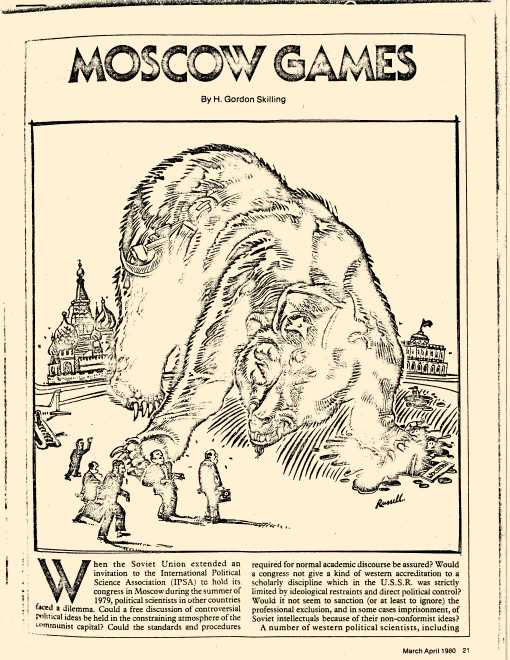
The controversy was not limited to the Executive Committee or even to the Association. The matter changed dramatically from a political science issue to a political issue and was discussed in the American, Russian, and French press. The arrest of the dissident academics Yuri Fyodorovitch Orlov and Alexander Ginsburg in 1977 and 1978 was clearly inconsistent with the Helsinki Accords and brought the debate home very starkly. Over the summer of 1978, the IPSA was called upon to justify its decision and provide a number of guarantees. The Executive Committee issued a communiqué to clarify the Association’s position. It contended there was no valid reason to refuse an invitation from a national association that had been a member of the IPSA since 1955. While “fully aware of its global responsibilities and of the international ramifications its judgment might have,” the Executive Committee stated that “no other discipline needs to break through borders, to stimulate recognition and comparative study of its subject as much as political science does,” and that pursuing this objective is even likely, in the end, to help “establish a climate of confidence and mutual respect between different societies, ideologies and political systems.” However, the Committee did set one indispensable condition: every bona fide political scientist had to have free access to the Congress. The “consent to the meeting would be immediately withdrawn if the conditions of free access and freedom of communication, discussion, and speech were not respected.” 39
Still, as the Congress approached, the atmosphere became poisonous, and a last-minute controversy over the Israeli delegation’s visas made it uncertain whether the Congress would go forward at all. A sort of paranoia emerged, as this anecdote recounted by then Secretary General John Trent illustrates:
Once—I was in Moscow—we were walking down the street, and the American [IPSA] Vice President [who] was next to me [said], “John, they’re following us.” I said, “Who’s following us?” He said, “The KGB.” I said, “Bullshit! No one is interested! They don’t care about a couple of political scientists!” [You know], they always had bugs in our hotel rooms, but they did that for everyone. Finally, I took him by the arm, pulled him into the doorway of a building and told him, “Wait! Wait!” There was nobody there. There was absolutely nobody. I said, “Are you convinced now? Okay?”40
When the Congress opened, the main goal had been achieved; all the collective members of the IPSA were represented by delegations, and not a single political scientist was denied a visa. However, the proceedings of the Congress did give rise to controversy. Problems arose, although supporters and opponents of the Association’s policy obviously did not ascribe the same importance to them. Some people pointed to the lack of participation by many American researchers, the “contamination” of political scientists in attendance by Soviet propaganda, the large number of panels on Lenin’s thought, and the exclusion of the dissident mathematician Aleksandr Lerner from the debates. In contrast, others stressed the attendance at the Congress by representatives of all the collective members of the IPSA, the fact that thousands of papers had been imported to the Soviet Union, or the fact that, on the whole, the Congress was well run, an encouraging point in view of the 1980 Olympic Games which were due to take place in Moscow.
In the final analysis, given the numerous and contradictory interpretations of the record of the Congress, it is difficult to conclude whether it was a “success” or a “failure.” The truth probably falls somewhere in between. One thing is certain, though; the decision to hold the Congress in Moscow was a bold move that ran counter to the political climate of the times. Whatever Moscow’s shortcomings, a meeting of East and West did take place. Three years later there was a meeting with the Third World in Rio de Janeiro, and some years after that, in 2003, a meeting of North and South in Durban. In politically—not to mention financially—unfavorable circumstances, the IPSA asserted itself and stood firm on its original objectives: despite physical and intellectual barriers, to do everything possible to create an international community of specialists in political science.
Notes
33 Letter from Jean Meynaud to Harold Zink, 4 February 1951. Translation.
34 Letter from William A. Robson to Jean Meynaud, 24 December 1954.
35 Letter from Jean Meynaud to William A. Robson, 20 March 1952. Translation.
36 Letter from John Goormaghtigh to Maurice Duverger, 19 August 1958. Translation.
37 The language policy of the Abstracts illustrates this duality: the abstracts for all articles originally published in English are in English, while the abstracts for articles in a language other than English may be in English or French. The IPSA’s Constitution is also in both languages, although only the French version is legally binding since the IPSA’s official headquarters are in Paris. In the IPSA’s work and debates, English now predominates, as it does in all disciplines.
38 Letter from William A. Robson to Jean Meynaud, 5 March 1955. Translation.
39 Declaration of the IPSA Executive Committee concerning the organization of the 1979 World Congress in Moscow. Translation.
40 Personal interview with John Trent, 13 November 2008. Translation.
Conclusion
How political science will develop as our Association expands its influence to local associations in all areas of the world, I cannot say….
Quincy Wright
First president of the IPSA in his opening address to the Zurich Congress,
4 September 1950
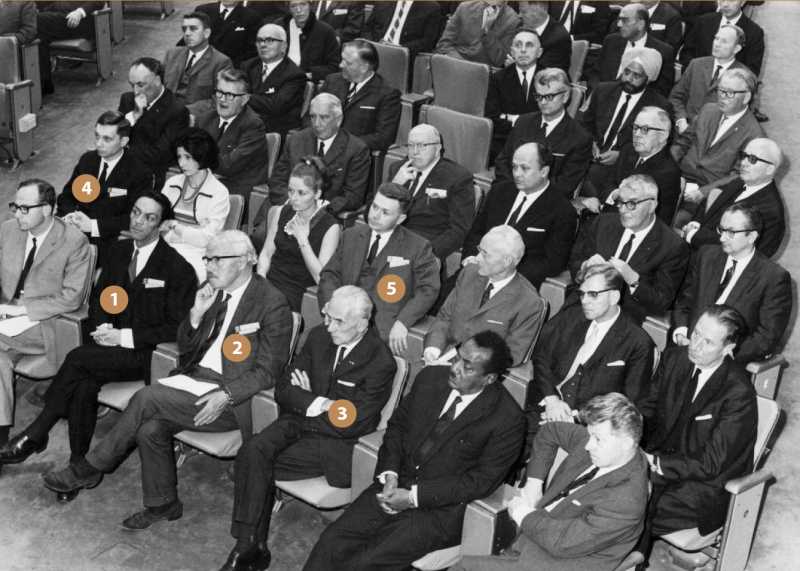
Areal conclusion to this partial (in both senses of the word) depiction of the history of the International Political Science Association is not easy to write and should ideally await a definitive account and clearer prospects for the future. The best we can offer now are some subjective conclusions and conjectures.
It would be too much to say that the IPSA has achieved the goals originally set for it by the United Nations Educational, Scientific and Cultural Organization. Together with other international associations, it was given the task of reducing international tension, improving the operations of political institutions and helping civilization flourish. Although the Association has fostered dialogue between political scientists of different nationalities across political boundaries, we would be hard put to credit it with any responsibility for such geopolitical events as the thaw in the Cold War.
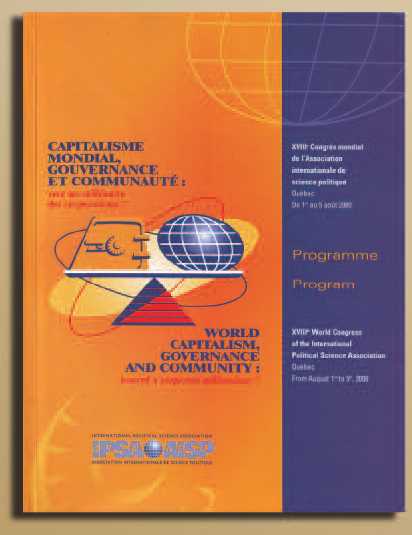
However, the IPSA has undeniably geared its activities to supporting its constitutional aim of “[promoting] the advancement of political science throughout the world,” and it is mainly due to the gradual consolidation of its institutions that it has been able to progress towards fulfilling this goal. In organizational terms, since its inception the IPSA has been able to acquire stable political structures and adapt their operations to the times. The Association has also managed to develop an administrative base that can support more diversified activities. Consequently, it is both flexible enough to be innovative in its undertakings and strong enough carry them out.
The multiplicity and variety of these initiatives bear ample testimony to the role the Association has played in the intellectual advancement of the discipline. Although we cannot measure their impact precisely, the Congresses, Round Tables, Symposiums, the Review, the Abstracts, and the books have each in their own way helped create the intellectual landscape of the political science we know today.
Without doubt, though, the IPSA’s most important contribution to the advancement of the discipline has been social rather than purely intellectual. If an international community (in the Mertonian sense) of political scientists now exists, the IPSA has certainly helped build it. It is has not been alone in this work. The European Consortium for Political Research, the International Studies Associations, and even the American Political Science Association have all had a part in bringing impressive numbers of political scientists together from every part of the globe. It is therefore difficult to attribute the development of transnational research networks to any particular institution. But the successes the Association has garnered over the first sixty years of its existence are so many bricks it has laid to build the structure that all these organizations share.
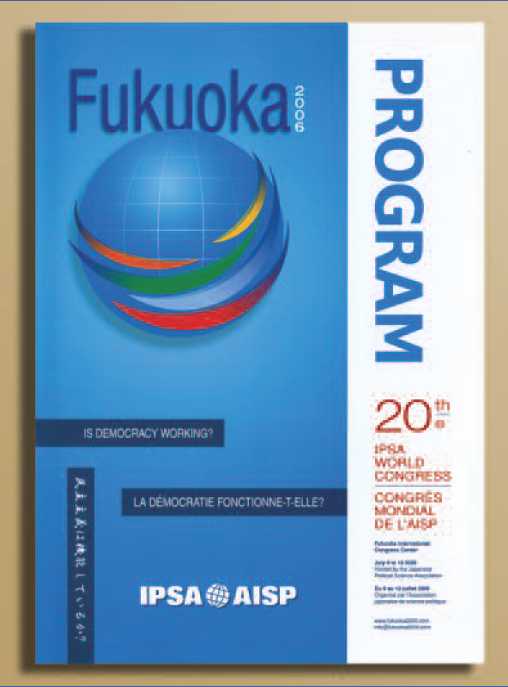
Its contributions sometimes stemmed from bold decisions it made in particular cases. For example, it built bridges between East and West in a year marked by rising political tension between Moscow and Washington. Similarly, it disregarded financial considerations and held Congresses in Rio de Janeiro and Durban to build bridges between North and South. However, its contributions have also been the result of longer-term programs and dynamics. First and foremost among these were the efforts it focused on membership; through active and consistent canvassing, the Association managed to take in enough collective members to claim almost universal geographic coverage. Its publication, the International Political Science Abstracts, is an original means for disseminating knowledge produced by the discipline across linguistic barriers. Through the Research Committees, the IPSA has formed and sustained multinational research groups by providing logistic and financial support, and it has provided opportunities for regular international meetings through its Congresses, Round Tables, and Symposiums.
Looking to the future, we can offer only the barest outline of the challenges that the IPSA must yet take up in cooperation with other national and international political science associations. Despite its successes, some of the issues that were identified sixty years ago are still pertinent today, such as the questions about methods and teaching that were deemed priorities in the late 1940s. The exponential growth of methodological and theoretical approaches and the renewal in terms of traditional pedagogical methods make it perhaps more vital than ever to maintain the dialogue between the different schools that comprise contemporary political science. Nor has the constitutional mission to promote the discipline on all five continents been accomplished. Too many countries, including even such large ones as China, are still outside the IPSA fold. To bring them in, the Association will no doubt have to make use of what has become its trademark: its ability to combine traditions and strong institutional foundations with bold political action.
